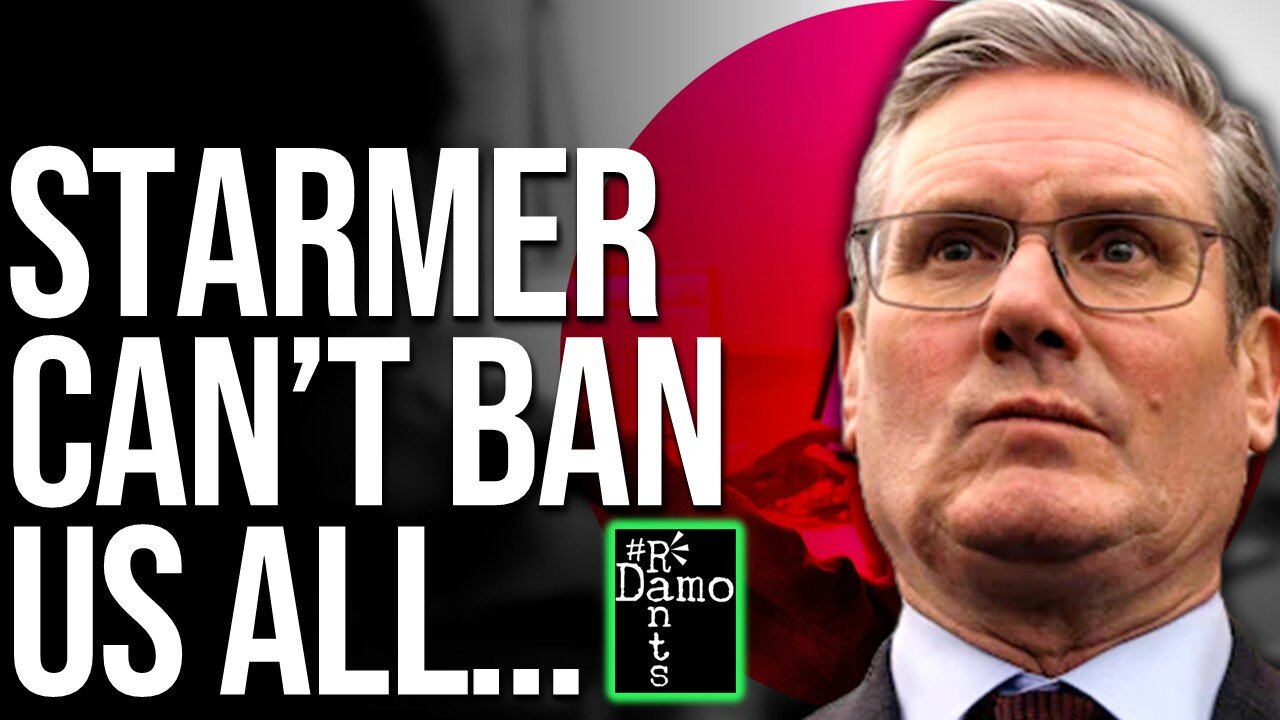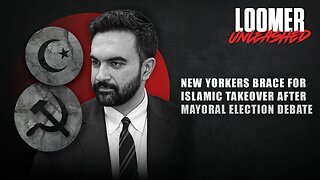Premium Only Content

Starmer Tried to Crush Palestine Action — But Sparked a National Uprising
Right, so it’s almost impressive watching Keir Starmer – and I’m rarely impressed by this man as you know - the man who promised integrity, instead lead the charge to outlaw the nation’s conscience, especially where it comes to Israel and Gaza, especially when it comes to protest. The government that can’t regulate rent or energy prices has somehow found time to declare that protesting genocide is ana ct of terror as the proscription of Palestine Action has shown. But actually the problem goes far deeper than that. Universities are now spying on their students for the Israeli arms firms themselves. Police are arresting pensioners for holding up slogans. And the Home Office — having been turned into a graveyard of moral principle — has decided that the real threat to national security isn’t those arms dealers or the war criminals they supply, but the people standing in front of them with banners. It would be funny if it weren’t so historically familiar. When the state runs out of arguments, it reaches for the handcuffs. When a democracy starts criminalising empathy, it’s not defending itself — it’s confessing. And in 2025, Starmer’s Britain is confessing very loudly indeed.
Right, so we’re going to begin this one in Lancashire, at the gates of the Samlesbury Aerodrome, where the BAE Systems logo glints above the steel fences like a warning label, here there be no morals. Yesterday, about sixty people stood before it — teachers, nurses, students, and trade unionists — blockading the factory.
For six hours, one of Britain’s most profitable weapons factories fell silent. The Samlesbury plant builds the rear fuselage for every F-35 fighter jet in the world. Those fuselages become part of the jets that Israel flies over Gaza. Every one carries a barcode that traces back to Lancashire. Protesters call the site the kill chain. The British state calls it national security.
Police describe the protest as peaceful. There are no arrests, no vandalism, just a line of people refusing complicity. But what happens outside those gates is larger than one demonstration. It marks the collapse of a strategy that was supposed to scare the conscience out of all of us across Britain.
As we all know, Keir Starmer’s government has used the Terrorism Act 2000 to ban Palestine Action. The Samlesbury action was not them, there are plenty of other groups, protest will always find away, you simply can’t legislate it out of existence. People will protest regardless. The Home Office said it was a “serious threat to public safety.” The real threat, of course, was moral clarity. The activists’ crime was to expose Britain’s material role in a genocide that much of Westminster still pretends is no such thing.
Samlesbury and other incidents besides, have proved the ban has backfired, a ban they may yet be overturned. What the government thought it could outlaw, it had only multiplied.
When the then Home Secretary Yvette Cooper stood before Parliament in July to announce their proscription, she did it with the bureaucratic detachment reserved for policy briefings and budget cuts. Palestine Action, she said, had engaged in “criminal damage designed to coerce government.”
That phrase — “coerce government” — was the grotesque heart of the argument. The government was describing public pressure itself as terrorism. It was a statement that moral protest had become indistinguishable, in the eyes of the state, from physical violence.
Legal scholars called it a constitutional perversion. They pointed out that the Terrorism Act had been written to stop bombings, not banner drops. Yet the Labour government repurposed it to defend a weapons industry that supplies a state currently under investigation for genocide.
The result has been so predictable as a result. Within weeks, the numbers told the story: 890 people arrested in London for “displaying articles in support of a proscribed organisation.” Among them were teachers, students, and pensioners. Their offence: wearing a T-shirt or badge or holding up a cardboard sign with Palestine Action on it. The Home Office used those arrests as justification for a new round of protest restrictions, the so-called “repeat protest” powers we’ve just heard about, new Home Secretary Shabana Mahmood doubling down on her predecessors stupidity.
The same week, London hosted the DSEI 2025 arms fair. Fifty-one Israeli companies exhibited. Their missile systems and drone components were displayed in polished glass booths a few miles from where those arrests took place. No minister questioned the legality of that. No police raids were ordered. The contrast was grotesque. Peace was prosecuted; immoral profit was protected.
The ban was supposed to restore control. Instead, it has detonated in the government’s hands as it was always going to. What began as an attempt to brand Palestine solidarity as extremism exposed the extremism of Britain’s own double standards.
The proscription failed because it misunderstood the nature of moral movements. You can ban a group, but not a principle. Within weeks, new networks emerged to fill the void. Workers for a Free Palestine, Stop Arming Israel, and local Palestine Solidarity Campaign branches filled the space that Palestine Action once occupied.
The Samlesbury blockade was their answer to proscription. It wasn’t orchestrated from above. It didn’t need to be. It was the spontaneous reaction of ordinary people who understand that the moral line had been crossed. Blow to the government and its overreach – we’re not having this.
The blockade halted production for six hours, shutting down a factory that makes the backbone of Israel’s air campaign. Witnesses saw banners from Unite, PCS, UCU, and NHS Workers for Palestine. There were engineering students from Manchester, lecturers from Lancaster, and retired teachers from Preston.
When police asked who the organiser was, one activist said simply: conscience is our organiser.
That was the point. By banning an organisation, the state had decentralised the idea. Resistance no longer needed a name or hierarchy. It is a civic reflex. Sociologists call this the “hydra effect” — every act of suppression creates new heads of resistance.
Samlesbury proved the model worked. Protesters now combine meticulous legality with total defiance. They livestream actions, coordinate legal observers, and cite export licence data in real time. They know the law better than the officers enforcing it. They also know that every arrest strengthens their argument: if non-violent protest is terrorism, then terrorism has no meaning left.
The same pattern has been repeated in Sheffield, where another F-35 parts supplier — Forged Solutions Group — was blockaded. There were similar scenes in Brighton, Newcastle, and Glasgow in recent weeks. What the state imagined as deterrence through its clampdown of Palestine Action had become the template for mass participation instead.
But the most chilling sign of how far this logic has spread through establishment ties came not from Westminster and the Starmerroids in charge, but from our universities now instead.
An investigation headed by Liberty Investigates has obtained internal emails proving that several British universities have been monitored their own students for arms manufacturers. Heriot-Watt in Edinburgh, Loughborough, Cardiff, and Glasgow were among those that have been named. They tracked social-media posts, monitored WhatsApp groups, and flagged “potential disruptions” ahead of corporate events with defence contractors.
One message showed Heriot-Watt’s security chief promising to implement “enhanced CCTV and social-media monitoring” for a Raytheon UK careers fair. Raytheon, of course, supplies missiles used by Israel in Gaza. The university claimed it was protecting “safety.” What it was really protecting was its funding.
Between late 2023 and early 2025, thirty-seven universities disciplined around two hundred students and staff for pro-Palestine activism. Many were accused of “bringing the university into disrepute.” None were accused of violence.
This wasn’t just moral cowardice; it was structural alignment. British universities have become financially dependent on the arms trade. Engineering and computer science faculties receive millions from BAE, Rolls-Royce, and the Ministry of Defence. Research projects in artificial intelligence, drone guidance, and surveillance systems often carry dual-use contracts that serve both commercial and military ends. When students challenge that relationship, they are not confronting abstract policy — they are threatening revenue streams.
In that light, the spying scandal isn’t an anomaly. It’s the logical extension of a system where every public institution now functions as part of Britain’s security-industrial complex. Universities that once taught ethics are now enforcing obedience instead.
The government didn’t have to tell them to do it. The culture of fear and the economy of dependence did the job.
Keir Starmer promised integrity when he entered Downing Street in July of last year. What he delivered was the continuity of his predecessors with added authoritarianism. The Public Order Act remained untouched. The Palestine Action ban went ahead. Police powers expanded under the justification of “repeat protest” control.
The pattern is familiar: call repression “safety,” call complicity “security,” and hope the public stops noticing the difference.
The political opposition has collapsed into consensus. Labour and the Conservatives now compete only on tone. Both defend arms exports as “strategic necessity.” Both describe Gaza as a “complex situation.” Both frame mass protest as a nuisance. And Reform UK go even further than that, practically humping Israel’s leg like a particularly fruity Jack Russell.
Meanwhile, the BBC reduces demonstrations of hundreds of thousands to a sentence about “traffic disruption.” Newspapers recycle police statements without question. The idea of moral journalism has been replaced by stenography.
Even academia, as the surveillance scandal now breaking has showed, now acts as an arm of state messaging. University press offices issue statements about “tolerance and balance” while quietly feeding student data to defence firms. Every layer of institutional Britain — political, media, academic — now moves in unison around the same idea: dissent is danger.
The result is a country whose legality has outlived its morality. Exporting weapons to a state committing war crimes is legal. Objecting too loudly to that arrangement is not. The contradiction is unsustainable. The more the government insists it is defending democracy, the more obviously it exposes its decay and people aren’t stupid and they don’t like it and so they still protest anyway.
The numbers reinforce the point. BAE Systems recorded profits above twenty-five billion pounds in 2025, driven by F-35 orders. The UK authorised over half a billion pounds in arms sales to Israel between 2015 and 2024. Every law against protest protects those figures.
The ban on Palestine Action was not about security; it was about shielding that revenue stream.
The government’s mistake is assuming fear still works. It doesn’t.
Fear is effective only when obedience feels safe. But when people watch peaceful protesters being treated as terrorists, the fear reverses direction. They stop fearing protest and start fearing the state.
That shift is becoming more visible everywhere: in the growth of decentralised actions, in the solidarity networks forming between trade unions and student groups, in the rapid public backlash to every new police power.
Sociologist Charles Tilly once said that social movements win when they occupy the moral ground the state claims for itself. The British government has vacated that ground entirely. Each arrest, each surveillance scandal, each corporate-funded university statement widens the gap between official virtue and public conscience.
At that point, the state’s power becomes performative — laws passed for their symbolism rather than their enforcement. The Public Order Act, the protest bans, the arrests under the Terrorism Act — all have become rituals of denial, attempts to reassert legitimacy through control. But every use of those powers is also an admission that persuasion has failed.
The repression has therefore backfired on every level: legally, politically, and psychologically. The more the government clamps down, the clearer it becomes that it is not protecting democracy but policing embarrassment.
Britain has been here before. Every time the country confronts a moral reckoning, it reaches for repression. The suffragettes were called extremists. The anti-apartheid movement was labelled subversive. The miners were treated as insurgents. Each time, the state mistook dissent for disorder and discovered, too late, that its legitimacy depended on the very people it tried to silence.
The pattern repeats because the underlying reflex never changed: when power runs out of arguments, it reaches for the police.
The proscription of Palestine Action follows that historical record exactly. It is the empire turning inward — using colonial logic against its own citizens. It is the state saying: you may vote, you may speak, but you may not disrupt the flow of weapons to our allies.
Therefore repression becomes confession.
There is a cruel symmetry to what has happened. The government banned a movement in order to destroy it. In doing so, it built a larger one.
The six-hour blockade at Samlesbury did more than stop a production line; it demonstrated that the state no longer controls the moral narrative, even after trying to make an example of Palestine Action. The same banners that ministers hoped would stop popping up, now appear at every march. The fact is you can’t proscribe us all.
Every new law confirms the truth of that as protest continues regardless. Every expansion of surveillance, every arrest, every university scandal reinforces the argument that Britain’s democracy has collapsed into managerial authoritarianism.
What began as a campaign about Gaza has become a referendum on Britain’s moral identity now and people are voting with their feet and their placards and their locking on.
The lesson of the last year is a simple one, but given Starmer’s lot don’t seem to get it, I’ll try and dumb it down for their benefit. You can outlaw an organisation, but not the instinct to refuse injustice. You can call protest terrorism, but you cannot redefine compassion as crime and expect a society to remain sane.
The proscription of Palestine Action, the arrests, the spying — none of it has restored order, civic disorder through protest is our right after all. It has only shown that the government is frightened of its own citizens. Britain’s institutions, from Parliament to the lecture hall, are no longer moral authorities; they are security subcontractors and so we need a massive reset that establishment parties will never deliver.
The movement they tried to crush has survived because it does not depend on permission. It survives in the people who still know the difference between law and justice, between safety and silence.
When future historians look back, they will not remember the ministerial statements or the legal definitions. They will remember that, on a cold morning in Lancashire, ordinary people stood before the gates of BAE Systems and brought a piece of the war machine to a halt. They will remember that when Britain called empathy un-British, its citizens redefined what being British meant to them.
The government can call it extremism all it likes, the press can call it disruption, the universities can call it misconduct. History will call it what it always is when decency confronts power — a beginning.
Because repression doesn’t end a movement. It exposes the guilt that created it.
And the state can ban a name, but not the heartbeat behind it.
Starmer can’t exactly talk much about what is un-British and what isn’t when he decided to leave British citizens to Israel’s mercies, as UK members of the Sumud Freedom Coalition became a matter for Israel and not the government apparently. So much for British sovereignty then if Israel apparently has a veto on that. Get all the details of that story in this video recommendation here as your suggested next watch.
Please do also hit like, share and subscribe if you haven’t done so already so as to ensure you don’t miss out on all new daily content as well as spreading the word and helping to support the channel at the same time which is very much appreciated, holding power to account for ordinary working class people and I will hopefully catch you on the next vid. Cheers folks.
-
 13:50
13:50
Nikko Ortiz
17 hours agoStop Hurting Yourself For Views.
6.81K3 -
 2:07:06
2:07:06
Side Scrollers Podcast
1 day agoDiaper Furry Streamer Gets ONLY ONE DAY Suspension + Hasan PLAYS VICTIM + More | Side Scrollers
36.5K20 -
 56:38
56:38
DeProgramShow
1 day agoDeprogram with Ted Rall and John Kiriakou: "Jake Tapper on the Global Hunt for an Al Qaeda Killer”
6.47K3 -
 1:43:07
1:43:07
The Michelle Moore Show
2 days ago'The 12 Open Doors' Guest, Steve Jarvis: The Michelle Moore Show (Oct 17, 2025)
16.2K11 -
 LIVE
LIVE
Lofi Girl
3 years agolofi hip hop radio 📚 - beats to relax/study to
99 watching -
 1:45:06
1:45:06
Badlands Media
1 day agoDevolution Power Hour Ep. 399: No Kings, Antifa’s Collapse & Trump’s Year of Peace
281K87 -
 2:56:00
2:56:00
Laura Loomer
11 hours agoEP150: New Yorkers Brace For Islamic Takeover After Mayoral Election Debate
84.1K103 -
 1:35:37
1:35:37
Man in America
15 hours agoThe Forbidden Medicine of Light: Why is Big Pharma HIDING This From Us?
66K28 -
 2:35:13
2:35:13
BlackDiamondGunsandGear
8 hours agoAFTER HOURS ARMORY / BUILDING GUNS ARE ILLEGAL? / Marine Gun Builder RETURNS!!
24.7K3 -
 2:05:19
2:05:19
Damysus Gaming
9 hours agoARC Raiders - SERVER SLAM TIME!!!! LFG!!!
38K2